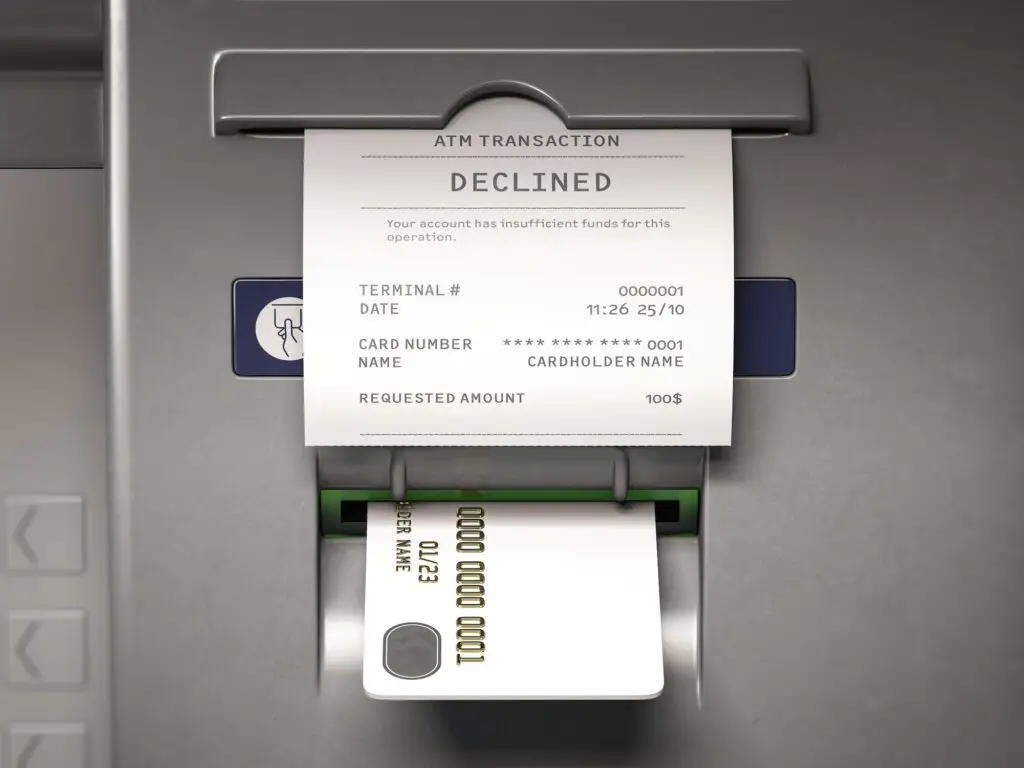A debit card is a great financial tool for making payments and managing your money. But sometimes, cardholders find themselves in the frustrating position of having their debit card declined, even when they have enough money in their account. This can be a very frustrating and embarrassing situation, and cardholders may wonder, “Why was my debit card declined?” and “How do I fix it?”
This article serves to answer those questions and provide a comprehensive overview of the various reasons a debit card may be declined and how to resolve such a situation. We will discuss in detail each possible reason why a debit card may be declined, tips for avoiding declines in the future, and steps cardholders can take to improve their chances of successful transactions.
Why are Debit Cards Declined?: Common Reasons
No Funds Available: The most common reason for a debit card being declined is insufficient funds. This simply means the cardholder does not have enough funds in their account to cover the purchase. This can happen when the cardholder has not checked their balance and used their card without keeping in mind their spending limit.
Expired Card: An expired card is another possible reason for a debit card being declined. Cardholders will usually receive notification beforehand when their card is about to expire, so if it has not been renewed, the cardholder will need to update the expiration date before the card can be used.
Fraudulent Card Use: The issuing bank may also decline a debit card if they suspect the cardholder has either lost their card or it has been stolen, and an unauthorized user is trying to use the card. This is a safety measure taken to protect cardholders from fraudulent activity.
Failing to Comply With Financial Institution Policies: Financial institutions will sometimes decline debit cards if the cardholder has not followed the institution’s rules or policies. This could include not providing enough information for an international purchase or not providing the institutions with updated personal information.
Technical Issues: Sometimes a debit card may be declined due to technical issues with the card or the card provider. This could be a hardware or software issue with the debit card itself, or it could be an issue with the banking system. This type of issue is usually temporary and should be fixed if the cardholder contacts their bank or card provider.
Tips to Avoid Debit Card Declines
Check Your Balance: One of the best ways to avoid getting a declined payment is to make sure you keep an eye on your balance. Keeping track of your balance will help you avoid spending more than you have in your account. Many banks have mobile apps or SMS notifications that you can use to get up-to-date balance information.
Keep Your Personal Information Up to Date: It is important to make sure your financial institution has the most up-to-date information on you, such as your address and phone number. This information is needed for verification purposes and can help avoid declines due to suspicious activity.
Perform Regular Security Checks: It is also important to conduct regular security checks on your card. Always make sure your card is in a safe and secure location, and never share your pin with anyone. Additionally, if you suspect unauthorized use of your card, contact your bank immediately to report the issue.
Update Your Card: Finally, make sure to update your debit card regularly. Check the expiration date of the card and the credit limit from time to time, and make sure all of your personal information is up to date as well.
How to Fix a Declined Debit Card
Once you have determined why your card was declined, there are several steps you can take to fix the issue.
Contact Your Financial Institution: The first step is to contact your financial institution. They will be able to provide more information as to why the card was declined and can often provide solutions to get your debit card up and running again.
Check Your Bank Account Balance: If you have insufficient funds in your bank account, it is important to check your balance and make sure you have enough to cover any purchases before using your debit card. You can do this using your bank’s online banking system or by calling customer service.
Update Your Credit Limit: If your bank has flagged a possible fraudulent transaction, they may have lowered your credit limit. To raise this limit, contact your financial institution and ask to update your information.
Update Your Personal Information: It is important to keep your personal and financial information up to date with your financial institution. This way, you can be sure that your information is accurate, and you are more likely to have successful purchases.
Final Thought
It is always a frustrating experience when a debit card is declined. Fortunately, cardholders can take steps to lessen the likelihood of this happening in the future by paying close attention to their bank balance, updating their personal information, and regularly performing security checks on their card. It is also important to keep an eye on expiration dates and credit limits.
By following the steps outlined in this article, debit cardholders can more easily avoid declined transactions and enjoy the convenience and security that debit cards offer.

